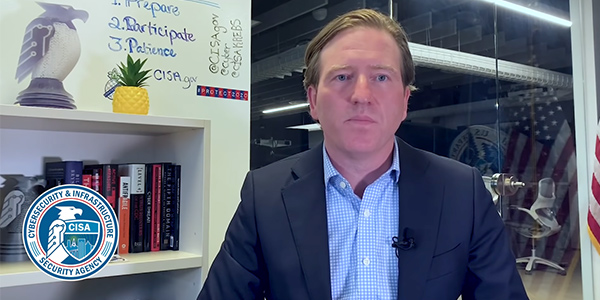Chris Krebs, founding director of the Department of Homeland Security’s Cybersecurity and Infrastructure Security Agency (CISA), was fired Tuesday night by President Trump, leaving a leadership void at an agency that has provided significant cybersecurity assistance to the utility sector since 2018.
Trump announced Krebs’ departure on Twitter, saying a “recent statement by [Krebs] on the security of the 2020 election was highly inaccurate” and citing a number of conspiracy theories the president has pushed to discredit President-elect Joe Biden’s victory, with almost no success in court.
The president’s tweet did not refer to a specific statement by Krebs. In recent weeks the director and his agency have repeatedly pushed back against claims of electoral fraud by Trump and his allies in media and government with resources such as the Rumor Vs. Reality page, which aims to correct misinformation circulating online. A joint statement issued last week by CISA and other organizations that participated in the Nov. 3 election called it “the most secure in American history” and said that there “is no evidence that any voting system deleted or lost votes, changed votes, or was in any way compromised.”
State of CISA Leadership Unclear
Krebs did not respond directly to Trump’s statement, but shortly after the president’s announcement, he tweeted, “Honored to serve. We did it right. Defend today, secure tomorrow.” He had reportedly expected to be fired since it became clear that Biden won the presidential election. Neither CISA nor DHS have released a statement on Krebs’ departure, and CISA has not updated its website to remove Krebs from its leadership page.
According to CISA’s leadership structure, the first person in line to succeed Krebs is Deputy Director Matthew Travis. However, according to an email to agency employees sent by Chief of Staff Emily Early and obtained by POLITICO, Travis was passed over by Trump in favor of Executive Director Brandon Wales.
Multiple media outlets, citing unnamed sources, have reported that Travis was pressured to resign by the White House; Wales is a career civil service employee and therefore cannot be removed by Trump without cause. Bryan Ware, the leader of CISA’s cybersecurity division, told POLITICO on Nov. 12 that he had resigned from the organization as well. His acting replacement, Matt Hartman, is also a career civil servant.
Democrats were quick to condemn the firing. Biden spokesperson Michael Gwin said in a statement that “Chris Krebs should be commended for his service in protecting our elections, not fired for telling the truth,” while Rep. Adam Schiff (Calif.) said on Twitter that Trump “can’t understand Chris Krebs or others … who put duty and service to the country above all else.” House Speaker Nancy Pelosi (Calif.) issued a statement criticizing Trump for “distracting and dividing the country by denying his defeat in the election.”
Republicans also praised Krebs, with Sen. Richard Burr (N.C.) calling him a “dedicated public servant who has done a remarkable job during a challenging time.” Sen. Rob Portman (Ohio) also said Krebs was “a real professional” who “was always responsible and helpful.” However, few Republicans were willing to criticize Trump directly: Sen. Ben Sasse (Neb.) was a rare exception, saying that “Chris Krebs did a really good job … and he obviously should not be fired.”
The 1st Director
Krebs joined CISA at the agency’s inception in November 2018, having served since June 2018 as under secretary for the national protection and programs directorate, CISA’s predecessor in DHS that was founded in 2007. Trump appointed Krebs to both positions. Before joining DHS, Krebs had worked for Microsoft’s U.S. Government Affairs team as the director for cybersecurity policy.
His leadership at CISA was marked by energetic outreach to bring together critical infrastructure sectors, including the oil and gas industries, with government entities, including regulators and intelligence agencies. Krebs saw the agency as a friendly middle ground where both communities could find a common purpose and work together to counter emerging threats from malicious cyber actors.
“What we’ve been doing for the last couple of years [is] getting away from this almost monolithic approach to critical infrastructure, where you have a sector that’s defined by the companies,” Krebs said at the Edison Electric Institute’s Virtual Leadership Summit in September. (See EEI Panel: Public-private Trust Key to Cyber Survival.) “Instead, we’re taking an approach where the critical infrastructure community is defined by the services and functions it provides.”
The convergence of the COVID-19 pandemic and the presidential election made 2020 a busy year for CISA, which in April published a list of guidelines for critical infrastructure sectors to reduce the risk of infections while operating control centers. (See Government Urges Action on Cyber Threats.)
Krebs joins a growing list of officials removed or demoted by Trump since his election loss. On Nov. 5, the president replaced Neil Chatterjee with James Danly as chair of FERC in a move seen by many — including Chatterjee — as retaliation for his support of a proposed policy statement endorsing the introduction of carbon pricing in wholesale electricity markets to address climate change. (See Trump Names Danly FERC Chair.) Chatterjee remains a commissioner and plans to finish out his term, which ends June 30.
The highest-level departure from the Trump administration post-election is Defense Secretary Mark Esper, dismissed Nov. 9 amid reported tensions with his boss over a range of issues. Several lower-rung officials have also left the government, including Valerie Smith Boyd, the assistant secretary for international affairs at DHS, and Lisa Gordon-Hagerty, under secretary of energy for nuclear security and administrator of the National Nuclear Security Administration.






